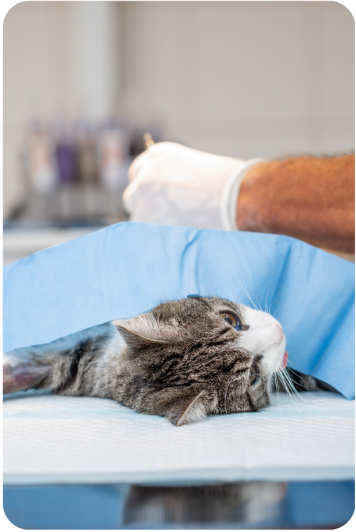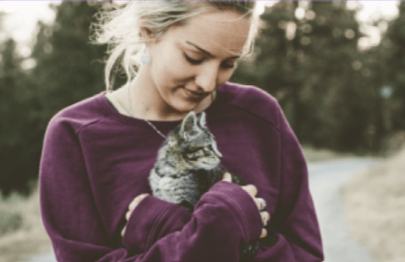
DESEX
Is it really necessary? Our vets recommend it for all pets and it’s best to do so when they’re about 6 months old. Desexing offers various health benefits such as reducing the risks of certain cancers, fatal infections and behaviour issues.
- Experienced and trained professionals
- Thoughtful aftercare services
- Medications to keep your pet comfy & happy
BENEFITS OF DESEXING

Reduced behavioural problems

Reduced prostate problems

Reduced incidence
of mammary cancer

Eliminates the risk
of fatal uterus infections
WHEN’S THE RIGHT TIME
Desexing is recommended for pets around 6 months of age but further assessment can be done based on your pet’s type & breed.
WHAT TO EXPECT
PRE-SURGERY QUOTATION CONSULT
Book a consultation online and our friendly customer service team will contact you within the day.
Your vet will share a step-by-step procedure and provide a cost estimate. Blood tests may be performed to ensure that anaesthetic drugs can be administered safely.

SURGERY DAY
Our team of friendly nurses will admit your pet into the hospital and give it a full body check before the surgery.

AFTER SURGERY
After the procedure, we’ll monitor your pet to ensure speedy recovery and provide medications for greater comfort and ease.
MEET OUR PROFESSIONALS
Say hello to our team of professionals with years of extensive training & experience in the field.

DR. MARTIN LI
Veterinary Surgeon
Year of Experience | 5+ years
Veterinary degree | BVMS, MRCVS
Language | English, Cantonese, Mandarin

DR. NATALIE CHOW
Veterinary Surgeon
Year of Experience | 8+ years
Veterinary degree | BVSc, MVM
Language | English, Cantonese

Dr. Martin Li
Veterinary Surgeon

Dr. Natalie Chow
Veterinary Surgeon
HEAR IT FROM OUR PAWRENTS
I recently had my puppy desexed at Creature Comforts. The team was incredibly knowledgeable and made sure to answer all of my questions before and after the procedure. My puppy came out of the surgery feeling great and was back to his normal self in no time. I highly recommend this service to all pet owners.
Client: Katy Cheung
"Honestly. I was a bit nervous about getting my cat desexed, but the team at Creature Comforts made the process so easy and stress-free. They took great care of my cat and even provided post-surgery tips and advice to ensure a smooth recovery. I am so grateful for their expertise and compassion."
Client : Jordan Kwok
Location
Veterinary Centre TKO
4300 sq ft flagship
Shop G18, Papillons Square, 21 Tong Chun Street, Tseung Kwan O
2915 7007 8am -8pm
East Island Animal Hospital
24 Hours Veterinary Service
256 Shau Kei Wan Road. Hong Kong Island
2915 3999 Service : 24hrs
Housecall
Award Winning
Door to Door
97730372 9am - 6pm
Housecall service will incur an additional charge
Frequently asked questions
- All Questions
- Surgery & Procedures
- 絕育手術
- EIAH APPOINTMENTS
- Renal Health
- Symptom Management
- 預約與更改
- Appointments and Rescheduling
- DESURGERY (NEUTERING)
- FreezePen
- In-Home Services
- Laboratory and blood bank
- PICKUPS
- Prescription Food, Medication and Item Pick-Up
- Preventive Care
- Preventive Health
- Safety
- Surgical Options
- 處方糧、藥物與領取物品
- 預約與取消
- 領取處方糧與藥物
- Anesthesia Safety
- Comfort & Stress Relief
- Diagnostics
- Health Benefits
- Hospitalization
- Lab Reports and Sample Collection
- Language and Visit Support
- Medication Dispensing and Delivery
- Other Common Questions
- Pre-Surgery and Ultrasound Prep
- SURGERY and ULTRASOUND PREP
- Spay and Neuter Surgery
- Special Treatments and End-of-Life Care
- VISIT INFO
- Visitation & Updates
- 其他常見問題
- 到訪與營業資訊
- 報告與樣本收集
- 手術與超聲波須知
- 手術與超音波檢查注意事項
- 特別療法與善終服務
- Surgery
- Cutting Edge Imaging
- Puppy and Kitten
- Dental
- Acupuncture
- Desex
- Laser
- Housecall Vet and Nurse
-
Should I keep my new puppy or kitten in a cage or let them roam around the house to get more familiar with the new environment?
You should supervise your puppy or kitten at all times to ensure they dont eat anything they shouldnt, and to make sure they dont hurt themselves. If you are supervising them, they can be allowed to explore their new home!
Should I neuter my puppy or kitten, even if I only have one pet at home?
As a general rule, puppies/kittens should be neutered at around 6 months old. You can give us a call to learn precisely when your pet should be desexed. There are many benefits, including reduced incidence of behaviour problems, reduced prostate problems, reduced incidence of mammary cancer and eliminating the risk of developing fatal uterus infections
When can I take my new puppy for a walk or to the dog park? I can't wait to let them meet some new friends!
Your puppy/kitten can come into contact with vaccinated animals 2 weeks after their second vaccine, and with unvaccinated animals 2 weeks after their final vaccination.
My new puppy or kitten cries a lot at night. What should I do?
You can help to train your pet to become relaxed when they are on their own. You can book an appointment with our Doctor, Dr Isabella, who has a special interest in behaviour. She can give you detailed advice on how to help your puppy/kitten sleep properly.
How much food should my new puppy or kitten eat per day?
Puppy and kittens should be on a puppy or kitten diet until they are 6 months old. Each brand of food has different recommendations, and you should follow the instructions on the packet. If your pet is under or over weight, we might recommend you feed a little more or a little less as appropriate
My new puppy or kitten looks quite dirty. Can I give them a bath?
You can bathe a puppy for kitten carefully, using pet friendly shampoo. You should ensure no water or soap gets in their eyes or in their mouth, and dry them with a towel straight away so that they dont get cold.
My pet's vaccine is overdue. Can I bring them for vaccination even if they haven't arrived at my home yet?
You can bring your pet in for a vaccination at any time, and we can give advice on which vaccinations they need and when they will need boosters
Should I bring my new puppy or kitten for a check-up before they arrive at my home?
We recommend bringing in your puppy or kitten in for a check as soon as you get them. We will give you advice on how to take care of them, what to feed them, which preventative medications they need, training tips and can discuss desexing and tooth brushing
Related Blogs






